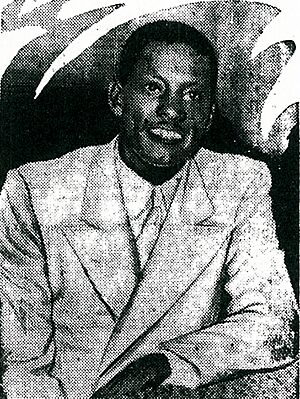Jimmy Bonner facts for kids
Quick facts for kids Jimmy Bonner |
|
|---|---|

Bonner in 1936
|
|
| Pitcher | |
| Born: September 18, 1906 Mansfield, Louisiana |
|
| Died: May 10, 1963 (aged 56) Oakland, California |
|
| debut | |
| October 23, 1936, for the Dai Tokyo | |
| Last appearance | |
| November 10, 1936 | |
| JBL statistics | |
| Win–loss | 0–1 |
| Earned run average | 10.24 |
| Strikeouts | 2 |
| Teams | |
|
|
James Everett Bonner (known as Jimī Bonna in Japan) was an American baseball player. He played for the Dai Tokyo team in the Japanese Baseball League. Bonner made history as the first African American to play professional baseball in Japan. This happened in 1936. It was 11 years before Jackie Robinson broke the racial barrier for Black players in Major League Baseball in the United States.
Contents
Who Was Jimmy Bonner?
Jimmy Bonner was a talented American baseball player. He is remembered for being a pioneer in the sport. He was the first African American to play professional baseball in Japan. This happened in 1936, long before many other players of color got similar chances.
Early Life and Family
James Everett Bonner was born on September 18, 1906, in Mansfield, Louisiana. He was one of five children. His parents were Peter and Martha Ann Bonner. When he was young, his parents divorced. His mother later married Rory Goldsmith, who worked at a sawmill.
Sadly, Rory Goldsmith passed away when Jimmy was still a child. By the age of 13, Jimmy was already working. He delivered items for a local drugstore to help his family.
Starting His Baseball Journey
Bonner began playing baseball when he was in junior high school. He showed great skill early on. By 1932, he was a utility player for the Shreveport Black Sports. A utility player can play many different positions on the field.
Jimmy was 5 feet 10 inches tall. He could throw with his right hand and bat with his left hand. This made him a versatile player. Later in 1932, he moved to West Oakland, California. There, he married Lillian Victor.
Playing in the Bay Area
In 1934, Bonner played for the San Francisco Colored Giants. This team is not the same as the modern San Francisco Giants team. The next year, 1935, he joined the Oakland Black Sox.
By 1936, Jimmy Bonner became a pitcher for the Berkeley Grays. They were part of the Berkeley International League. This league had teams with players from many different backgrounds in the San Francisco Bay Area. Bonner earned the nickname "Satchel" because he pitched so well. Once, he struck out 22 batters in just one game!
A Pioneer in Japan
On September 8, 1936, a Japanese-American businessman named Harry H. Kono invited Bonner to play baseball in Japan. He was asked to join the Dai Tokyo Baseball Club. This team was part of the new Japanese Baseball League.
Teams like Dai Tokyo and the Nagoya Golden Dolphins needed more skilled players. So, they started looking for talent in the United States. On September 18, Bonner traveled to Japan on a ship called the SS President Pierce. He arrived on October 5, 1936.
Bonner's Time with Dai Tokyo
Jimmy Bonner's salary in Japan was 400 Japanese yen a month. This was much more than the average 140 yen a typical Tokyo Giants player earned. The Japanese newspapers were very excited about his arrival. They wrote headlines like "Black Pitcher Rushes onto the Scene, Excellent Fielder, Holder of Amazing Strikeout Record."
Bonner played several positions for Dai Tokyo. He was a pitcher and a first baseman. While his defense in Japan was not always strong, he was a great hitter. He had a batting average of .458 in 24 turns at bat.
In mid-November 1936, Bonner left the team after about a month. Historians have suggested reasons for his pitching struggles. The strike zone in Japan was smaller, partly because Japanese men were generally shorter. Also, the baseballs used in Japan were smaller and more slippery than American balls.
Life After Professional Baseball
After his time in Japan, Jimmy Bonner returned to the United States. He worked as a porter for the Pullman Company. A porter helps passengers on trains. He also continued to play baseball semi-professionally.
In 1943, Bonner joined the U.S. Army. After World War II ended, he went back to work for the Pullman Company. He worked there until he passed away on May 10, 1963.
 | DeHart Hubbard |
 | Wilma Rudolph |
 | Jesse Owens |
 | Jackie Joyner-Kersee |
 | Major Taylor |

